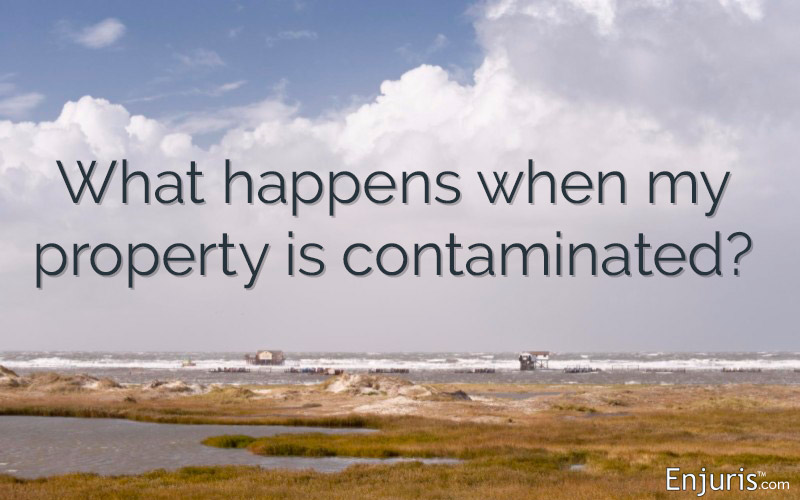Toxic torts and environmental concerns – and how to find a lawyer to help
After Hurricane Irma, many landowners in Florida were very worried about their properties – not just because of the flooding, but because of the dangerous chemicals like roach spray and paint thinners that would wash out of their garages, their neighbors’ garages, and backwash onto their lawns and into their houses. Flooded cars with petroleum leaking out (petroleum is lighter than water) that then dries in the sun and into the soil is another issue. Burst pipes and septic systems with both liquid and solid waste is yet another. Then there are the hazards at Superfund sites.
What would that mean? Would it seep into the ground? Would it get into their bodies? Would it affect their nervous systems, their brains? Would it cause cancer in a decade or two? Could they get compensation for something like that?
These are all very valid questions.
This type of case falls under an area of law called “property contamination,” a toxic tort. Property contamination can not only ruin property value, but it can also cause landowners to experience severe health issues. Contaminated water, harmful chemical vapors, or even polluted soil can come from a negligent oil or gas plant. However, it can even come from your own garage in some cases.
If your Florida land has been contaminated by a negligent company or individual, you are most likely doing everything you can to preserve your own health while figuring out how to proceed. We can help with that.
What is a toxic tort, anyway?
Toxic torts are personal injury lawsuits brought about by negligent exposure to dangerous chemicals or manufacturing byproducts.
These cover a variety of case types, including drugs with unintended side effects, exposure to toxic chemicals at work, or even consumer products that caused injuries because of their toxicity. Toxic tort lawsuits also include property damage from environmental contamination.
How property can become contaminated
There are a number of ways that your property can become contaminated. The following are some of the most common causes of property contamination in Florida:
- Chemical or oil spills
- Negligent drilling practices
- Natural disasters like hurricanes
- Improper disposal of chemicals or solid waste
- Leaking pipes or storage tanks
Florida’s “sponge-like bedrock” makes it a risky place for fracking, or hydraulic fracturing, another form of drilling in which water is injected into rock deep underground to fracture it and release gases. That injected water would need to bypass the aquifer from which Florida draws its water, and any activity on the part of energy companies would need to A) not cause earthquakes, B) not threaten the top-ground water supply with wastewater and C) be up-front about the chemicals they use.
There is currently a fight in the State Senate for fracking to be banned.
Fracking could cause air, water or soil pollution to contaminate your property and cause health issues for you and your family, as well as a loss in the quality of your land. You’ll want to make sure to hire a surveyor to fully inspect the damage for your records; that way the insurance company can’t fight you on that part, at least.
Can I sue? Oh man, I want to sue.
As always, knowing whether you can sue for a toxic tort is not a cut-and-dried thing. Florida law states that, in order to file a toxic tort case, you must illustrate that your property’s contamination stemmed directly from a source of pollution such as a gas, oil, or manufacturing company.
Additionally, if you suffered injuries or disease from your property’s contamination, you must be able to show that your injuries were directly caused by the contamination of your property and not from a preexisting condition. You have four years from the date of injury to file your claim in the Florida court system.
What damages can I collect from suing?
While tying the damages to the contaminated product will be difficult, it will be worth it in the end because the bills associated with a case of this nature can be voluminous. They might include the following:
- Medical bills (both past and any you might need in the future)
- A decrease in your property’s value because of the contaminant
- The cost of property cleanup
- In some cases, punitive damages
You might be eligible for punitive damages, although this is not very common for property contamination cases. These damages are intended to punish the defendant and discourage them from committing similar negligent actions in the future.
For instance, in the Exxon Valdez case, the U.S. Supreme Court ordered punitive damages because of the egregious nature of their actions; their negligence resulted in 11 million tons of oil being spilled off the coast of Alaska, which destroyed several fishing communities and devastated ecosystems. In the end, the oil giant had to pay approximately $2 billion.
Who’s going to clean up my property?
Your property will likely have to be cleaned by using a remediation plan designed by environmental experts and industry scientists.
However, before any cleanup can take place, you have to determine whether the property is actually contaminated and to what degree; fault must also be established.
The goal of a remediation plan is to bring your property back to its original state as it was before the contamination, or at least as close as possible. The second goal is to prevent further contamination from occurring.
How does an attorney fit into this situation?
Hiring an attorney can help you prove your property contamination case far faster than you would alone. There is fault to prove, after all, and complications can arise.
Your lawyer will prove fault and also work to make sure that those responsible (either a company or individual) will provide the money to pay for the extensive surveying and research that can come with a property contamination lawsuit. Your attorney will also fight for your rights to compensation for the damages you’ve suffered because of the negligence of large oil or gas companies.
Make sure the lawyer you hire is familiar with the nuts and bolts of property contamination and toxic tort law, and that he or she fully understands the complications that could arise.
A good attorney can help you significantly.
Resources to help you hire the best Florida toxic tort lawyer
- How to find a good Florida personal injury lawyer
- What does a Florida personal injury lawyer actually do for you?
- Choosing a personal injury attorney – interview questions
- Preparing to meet with a personal injury attorney
- How to talk to a lawyer
- Negotiating lawyers’ fees - how do accident lawyers charge? Are there any hidden costs?
See our guide Choosing a personal injury attorney.




